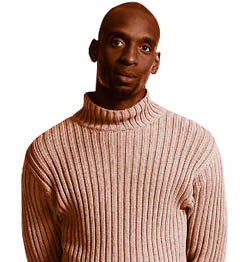|
Intermix.org.uk is a website for the benefit
of mixed-race families, individuals and anyone who feels they have a multiracial
identity and want to join us. Our mission is to offer a view of the mixed-race experience, highlighting icons, film, books, poetry, parenting techniques, celebrities, real lives and much more. Our online forums are a great place to meet others, ask questions, voice your opinions and keep in touch. Sign up for our monthly newsletter and delve into our pages. Want to join in? Become an Intermix member to take part: |
Transracial Adoptees & Adopters Give Us Their Views
 We
all have an opinion on transracial adoption but what do those who've
been adopted and those who've adopted have to say about it?
We
all have an opinion on transracial adoption but what do those who've
been adopted and those who've adopted have to say about it?
Rodney Williams is almost 30, but in some ways his life hasn't changed
since he was a boy.
'People still call me an Oreo, because of the way I talk,' he says.
Rodney, who is African American, was adopted by a white couple three
days after his birth. He grew up in Valley Forge and other Philadelphia
suburbs, and graduated in 1994 from the Church Farm School in Paoli.
As a young man, he said, he tried to talk to his parents about race.
'You get that PC, 'We don't see a difference. Color doesn't exist,''
he said. 'When I was young, I believed it. When I got older, I didn't.'
Shari Draayer, Rodney's mother, says she started out 'determined there would
be no difference in our family.'
She adopted more children of different races and built a diverse network of friends
and interests. Martin Luther King's birthday became a celebration of the civil
rights pioneers who had made their family possible.
'I don't know if Rodney ever saw it that way,' said Draayer, of King of Prussia.
'There were times I felt so impotent. ... No matter how much I read or how many
friends I have, I still don't know what it's like to be a black man in America.'
Shari says she encountered white landlords who agreed to rent to her - then balked
upon meeting her children. Black social workers told her that having African
American children was 'the new slavery.'
But, she said, she also met many thoughtful people, black and white, who cared
not a whit about the race of her 11 children. Most important, said Draayer, a
high school teacher, is that her children are growing up as caring individuals
who treat people of all races with respect.
The rewards of being a transracial family, she said, 'far exceed any of the dilemmas
or more painful things.'
Her son disagrees. Rodney, a manager at a Los Angeles hospital, is still searching
for where he fits in.
'Black people think I'm arrogant, because I talk 'proper,'' he said. 'White people?
'You're not like most black people.' That's what I get."
As for transracial adoption, 'I don't think it's a good thing,' he said. 'You're
already adopted, and then you add on top of that being a different race?'
Beth Hall recalls how she was pushing her children in their stroller when a neighbor
stopped her to ask: 'Do you do a lot of baby-sitting?'
Beth took that as code for something else: Who are you, a white woman, with these
different-colored children?
Her 18-month-old African American son was too young to understand the drama playing
out above him, but her three-year-old Latina daughter was listening.
'I think what you're probably asking,' Beth calmly told her neighbor, 'is: 'How
are we related?' And it can be confusing, because we do look different. But we
are a family."
Today, her children are teenagers, and Beth is director of Pact, a California
adoption alliance that assists children of color. She says that from day one
she has talked to her children about race.
Sometimes, it has been hard - like when her son realized that employees trailed
him through the aisles in stores. She can't protect her children from reality,
Hall said, but it is her obligation to prepare them. 'Nobody says, 'I'm going
to wait until my kids ask me about crossing the street.' Everyone understands
it's life-or-death.'
It's the same thing with racism, she said. 'Our kids won't be safe if we don't
talk to them. Black people understand that. White people don't.'
Bertelsen says he felt - and feels - fortunate to have been adopted. (His parents,
who also adopted two Korean children, declined to be interviewed.)
At the time, he was nearly five and lived in a black foster home. At first, in
his new family and mostly white neighborhood, he was confused. As an adolescent,
he associated with white people.
As he grew, 'I was no longer the cute biracial child. I was a young black male,
and that was threatening to some people.' By college, he identified himself as
African American.
Over time, he said, he has become less strident. He's about to marry a woman
who is of Japanese and Hawaiian heritage.
'I feel a lot richer for having had a multiracial family. Absolutely,' Bertelsen
said. 'It helps me in my work. And I kind of 'get it' on some level.'
Source:www.philly.com
:
